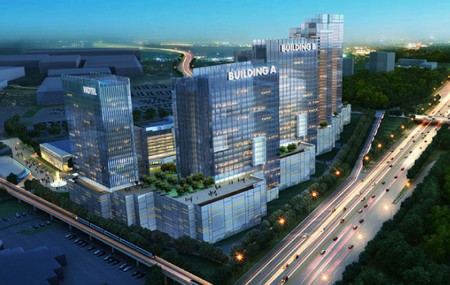The Dunwoody Planning Commission has voted to recommend the proposed Crown Towers development be approved by the City Council, but only if three-quarters of the condominium units are owner-occupied, rather than the 50 percent desired by the developer.

The Planning Commission’s decision follows a Dunwoody Homeowners Association vote on April 10 to support the project, but only if 75 percent of the units are owner-occupied condos.
City staff members have recommended the proposed 380 units be 90 percent owner occupied.
“So it’s not what we wanted, but 75 percent is better than 90 percent,” said developer Charlie Brown after the April 12 Planning Commission meeting. “We hope by the time it gets to the council it will be more of what we are looking for.”
The City Council will consider the project at its April 25 meeting.
Attorney Doug Dillard told Planning Commission members that developers are seeking to offer half the units for sale at the beginning, with the understanding that percentage jumps to 75 percent within five years.
“It’s very difficult to get financing for condos these days. We’ve had 16 banks talk to us … and they can’t finance at 90 percent owner-occupancy,” Dillard said.
Dillard said the proposed development provides less density than the amount allowed by current zoning on the property. That means less traffic, he said.
Planning Commission Vice Chair Heyward Scott has said he supports this kind of density in the Perimeter area especially because of the several MARTA stations located there.
Crown Holdings is asking the city to approve rezoning approximately 5 acres of land at the Gold Kist site, along Perimeter Center Parkway, to be rezoned to allow for a 30-story, 380-unit high rise condominium tower, a three-story retail center and a luxury 29-story hotel with approximately 150 rooms.
Fifteen acres of proposed development on the Gold Kist site does not require rezoning and would include two 24-story office towers, a restaurant, a conference center and a 28-story high-rise hotel. The project is expected to be completed in 2026.

With the two office towers, Crown Holdings already has approval to build 2 million square feet of office space. DHA wants that total to be lowered to 1.6 million square feet.
“It’s really about traffic. This is about a tradeoff. This gives them the opportunity to change the complexion [of the project],” Dunwoody Homeowners Association president Robert Wittenstein said. “The truth is, office space creates more traffic. Residents have less impact. The trade-off helps alleviate traffic.”
Crown Holdings has agreed to give up 400,000 square feet of office space–a reduction of 20 percent–in a draft of concessions it stated it was willing to make for DHA’s support of the project.
Brown said he was pleased the Planning Commission gave the project a thorough review. But the way the condo market works – building many units rapidly at the same time, as opposed to a subdivision, in which homes are built over a longer period of time – makes it difficult to sell all units right away.
“Not all condos are going to sell immediately,” Brown said. “You want some to rent to cover the cost” of building.
The units at Crown Towers are expected to sell for up to $500,000. Rent for them would likely be between $2,500 to $5,000 a month, Dillard said.
Brown said high-end residential would appeal to employees working at the nearby hospitals and the numerous companies and corporations located in the area.
At the April 10 DHA meeting, board member Rick Callihan said he opposed any kind of residential coming into Dunwoody.
“I can’t believe we are considering residential,” he said. “I don’t think it brings anything to the city.”
DHA board member Bill Robinson, however, said the urban development going up in Dunwoody does not spill over into the neighborhoods and does not affect the quality of life for homeowners.
“I’ve been here 43 years and every time [new development comes] it’s the same thing — ‘Don’t do it.’ We’ve wrung out hands and worried Dunwoody would go down the tubes. And it never has. It’s two different cities,” he said. “They can put towers up … and it doesn’t spill over into the neighborhoods. It never has.”
